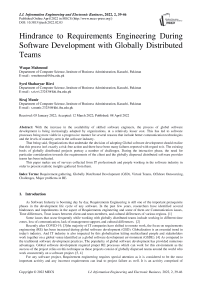Hindrance to Requirements Engineering During Software Development with Globally Distributed Teams
Автор: Waqas Mahmood, Syed Shaharyar Rizvi, Siraj Munir
Журнал: International Journal of Information Engineering and Electronic Business @ijieeb
Статья в выпуске: 2 vol.14, 2022 года.
Бесплатный доступ
With the increase in the availability of skilled software engineers, the process of global software development is being increasingly adopted by organizations, at a relatively lesser cost. This has led to software processes being more viable in a progressive manner for several reasons that include better communication technologies and the levels of maturity seen in the software industry. That being said, Organizations that undertake the decision of adopting Global software development should realize that this process isn't exactly a risk-free action and there have been many failures reported with regard to it. The existing bools of globally distributed projects portray a number of challenges. During the interactive phase, the need for particular consideration towards the requirements of the client and the globally dispersed distributed software provider teams has been indicated. This paper makes use of surveys collected from IT professionals and people working in the software industry in order to present realistic insights gathered from them.
Requirement gathering, Globally Distributed Development (GSD), Virtual Teams, Offshore Outsourcing, Challenges, Major problems in RE
Короткий адрес: https://sciup.org/15018326
IDR: 15018326 | DOI: 10.5815/ijieeb.2022.02.03
Список литературы Hindrance to Requirements Engineering During Software Development with Globally Distributed Teams
- R. H. W. M. Nabiha Usmani, "Impediments to Requirement Engineering in Distributed Team," International Journal of Information Engineering and Electronic Business, vol. 10, no. ijieeb.2017.06.02, pp. 10-18, 2017.
- N. Ali, "A Method of requirements change management for global software development.," 2015.
- S. Gregory, "Requirements for the New Normal: Requirements Engineering in a Pandemic," IEEE Software, vol. 38, no. 2, pp. 15-18, March-April 2021.
- H. H. Khan, "Risk Generating Situations of Requirement Engineering in Global Software Development," Second International Conference on Informatics Engineering & Information Science, pp. 221-233.
- S. N. Kumari, "A survey on global requirements elicitation issues and proposed research framework," ware Engineering and Service Science 4th IEEE International Conference,, pp. 554-557.
- W. M. Muhammad Jawed, "Agile development of e-commerce portals," 2017.
- J. H. a. A. Mockus, "An Empirical Study of Speed and Communication in Globally-Distributed Software Development," IEEE, vol. 29, no. 3, 2003.
- N. N. a. T. Z. D. Lo, "How Practitioners Perceive the Relevance of Software Engineering Research," in Proc. 10th Joint Meeting Foundations of Software Eng. (ESEC/FSE 15), 2015.
- T. T. a. C. B. HANISCH J, "Exploring the cultural and social impacts on the rrquirements engineering processes highlighting some problems challenging virtual team relationships with clients," Journal of Systems and Information Technology , 2001.
- B. I. J. A. S. A. S. A. A. a. M. A. M. Shahzad, "Reliable Requirements Engineering Practices for COVID-19 Using Blockchain," no. 12.
- J. S. N. A. A. B. June M. Verner, "Guidelines for industrially-based multiple case studies in software engineering," in Research Challenges in Information Science, 2009. RCIS 2009. , 2009.
- R. L. Naveed Ali, "Managing Requirements Change in Global Software".
- S. R. S. M. G. Waqas Mahmood, "The Emerging Role of Academia in SQA," International Journal of Engineering and Manufacturing, vol. 11, pp. 28-34, 2021.
- P. R. M. H. M. C. O. B. R. a. A. W. C. Wohlin, "Experimentation in Software Engineering," Springer, 2012.
- C. Wohlin, "Software Engineering Research Under the Lamppost," ICSOFT 2013, 2013.
- K. P. P. M. S. S Ravichandran, "Software Quality Assurance (SQA) : Current and Emerging Trends," Intelligent Electronic Systems, vol. 1, p. 31, November 2007.
- N. J. a. D. M. O. Dieste, "Software Industry Experiments: A Systematic Literature Review," in Proceedings of the 1st International Workshop on Conducting Empirical Studies in Industry, Madrid, 2013.
- A. Senchenko, "The Future Is Here: Top Software Testing Trends 2020," [Online]. Available: https://www.qamadness.com/the-future-is-here-top-software-testing-trends-2020/. [Accessed 10 Jan 2021].
- J. H. &. B. Corbitt, "Impediments to requirements engineering during global software development," European Journal of Information Systems, pp. 793-805, 2017.
- A. M. Layla Hasan, "A comparison of usability evaluation methods for evaluating e-commerce websites," Behaviour & Information Technology , vol. 31, no. 7, pp. 707-737, 2011.
- R. F. Viktoria Stray, "A Global View on the Hard Skills and Testing Tools in Software Testing," in ACM/IEEE 14th International Conference on Global Software Engineering (ICGSE), May 2019.
- D. Sjoeberg, J. Hannay, O. Hansen, V. Kampenes, A. Karahasanovic, N.-K. Liborg and A. Rekdal, "A survey of controlled experiments in software engineering," 03 October 2005. [Online]. Available: https://ieeexplore.ieee.org/document/1514443. [Accessed Dec 2020].
- S. Thilakasiri, "Advantages and Disadvantages of Heuristics," 10 02 2014. [Online]. Available: http://blog.sameerast.com/2014/02/advantages-and- disadvantages-of-heuristics/.
- C. R. P. H. M. O. M. R. B. W. A. Wohlin, "Experimentation in Software Engineering," Springer, 2012.
- S. M. S. M. H. Johan Lin˚aker, Guidelines for Conducting Surveys in Software, Sweden: Software Engineering Research Group, June, 2015.
- K. P. Paloli Mohammed Shareef, "Software Quality Assurance (SQA): Current and Emerging Trends," International Journal on Intelligent Electronic Systems ISSN 0973-9238, p. 5, 2007.
- V. S. Raluca Florea, "The skills that employers look for in software testers," Software Quality Journal (2019) Springer Science, Business Media, LLC, August 2019.


